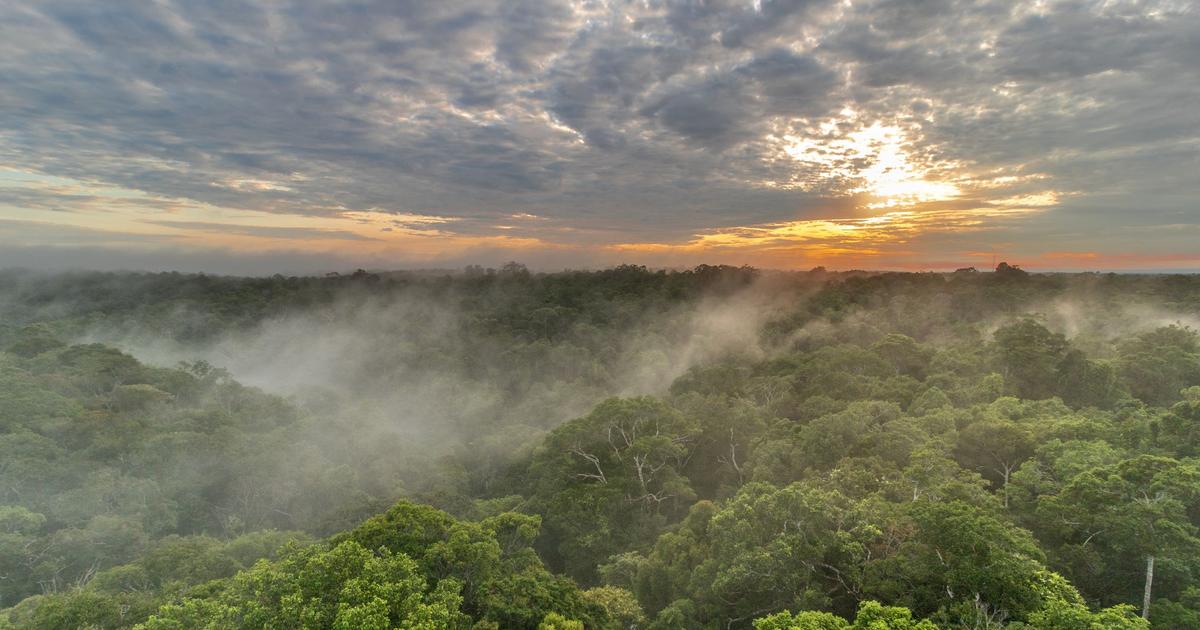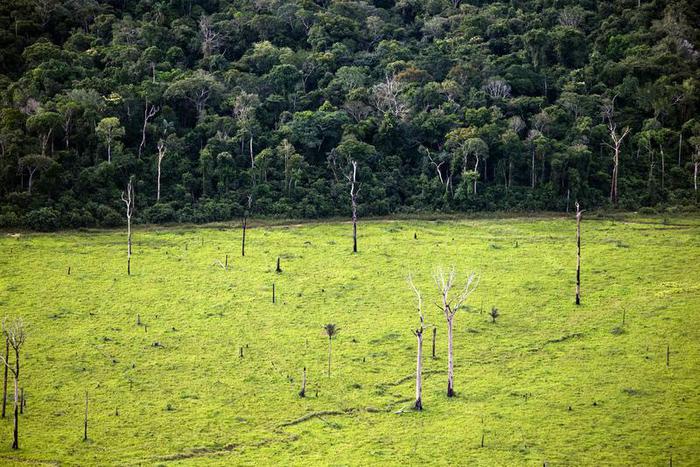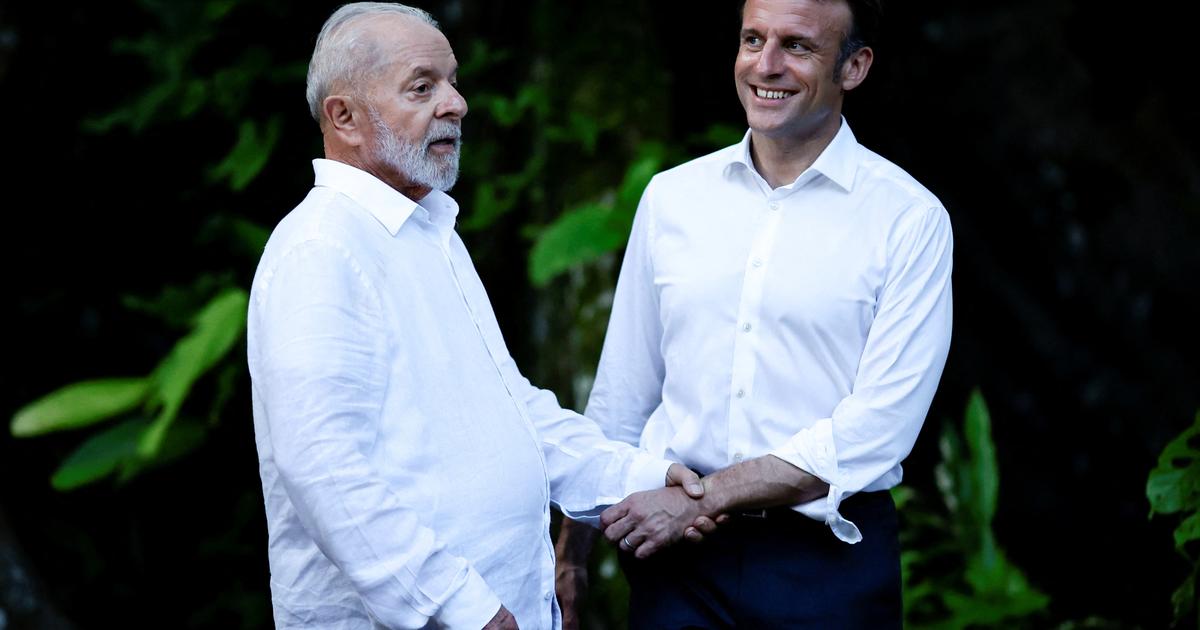Icon: enlarge
Burning area near the Brazilian city of Cláudia
Photo: Victor Moriyama / Rainforest Foundation Norway
Seldom has a political proposal generated such outrage as the "Veggie Day" planned by the Greens.
Seven years ago there was a corresponding passage from the party's election manifesto, and today it is still regarded by many as a sign of "incapacitation".
The consequential damage to meat production, which the proposal should help clarify, has not decreased since then, especially not in Brazil, where a large part of the protein-rich soy feed for German pigs, cattle and chickens is grown.
Germany imported 5.8 million tons of soy products in 2017, an area larger than that of Hesse is required for cultivation.
Most of them came from Brazil.
A field research by the Norwegian Rainforest Foundation and Deutsche Umwelthilfe shows how the demand for raw materials from Europe is driving the deforestation in Brazil.
While the local space institute INPE recently announced that last year as much forest had disappeared as it has not since 2008 and that more fires in the Amazon region and in the Cerrado steppe reported for July than in the record fire year 2019, the EU countries continue to buy a.
In the first half of 2020, soybean exports to the EU rose to 7.6 million tonnes, according to figures from the Brazilian Oilseed Association.
That was 75 percent more than in the same period last year.
Only China is importing more.
Although local soy imports have since declined, the Germans are still Europe's largest buyers of the miracle bean, which trims animals for rapid growth.
Without this fuel from factory farming, turbo fattening, in which, for example, chicks are fed to slaughter in 33 days, would not be possible.
"Zero Deforestation" Assurances
The investigation by the two NGOs documents illegal fires and the intimidation of smallholders in the Amazon and Cerrado regions, which are considered to be the hotspots of deforestation.
The neighboring villagers were "left completely alone" with the fires, says Anahita Yousefi of the Rainforest Foundation.
"People here often deal with land diggers, with agribusiness cowboys who burn common land and later sell it to agribusinesses."
According to the study, large commodity traders such as Bunge or Cargill are also profiteers from deforestation because they are supplied by questionable farms.
Both companies have been making "zero deforestation" assurances for years, so they promise not to participate in deforestation.
The new land grab is supported by the Brazilian President Jair Bolsonaro, who has repeatedly encouraged "exploitation" of the Amazon.
The fires, Bolsonaro said, would have set environmental organizations to take revenge for the cancellation of funds.
In the spring, his government legalized thousands of former forest properties that the now rightful owners had appropriated through land grabbing.
The EU is also involved in the questionable business: "20 percent of Brazil's soy exports to the EU are linked to illegal deforestation," says Jan Börner, Professor of Sustainable Land Use at the University of Bonn.
For a corresponding study, Börner and colleagues from Brazil, Sweden and the USA evaluated the data from 815,000 farms in the Amazon and Cerrado regions.
Two data sets were decisive for the scientists: the operating limits of the farms from the environmental cadastre and the deforestation rate, which the INPE Institute records via satellite images. "These two data sets are superimposed and then you know how much forest there is still on a farm."
A company in the Amazon region must maintain 80 percent of the forest on its land, at least 20 percent in the Cerrado.
If there are fewer, it has been illegally deforested.
Even if the soy of the respective farm is grown on a legal sub-area, it is "contaminated with illegality," says Börner.
Using export data from the districts, the scientists were finally able to compare how much soy from a district went to the EU.
more on the subject
Critical report on agricultural company Cargill: "The worst company in the world" By Nicolai Kwasniewski
Soy cultivation in South America: How the jungle is cleared for German meatBy Nicolai Kwasniewski
7766 Fire in the state of Amazonas: Brazil's rainforest burns like it has not been for a long time
Beef, soy, wood: The billion dollar business with Brazil's resourcesBy Claus Hecking
The research team of the Rainforest Foundation also visited the villages in the district of Formosa do Rio Preto, which is on the front line of the deforestation in the Cerrado - and the Estrondo farm community active there.
Together they farm 305,000 hectares, an area that is larger than that of the cities of Rio de Janeiro and Sao Paulo combined.
In the past, Estrondo has been repeatedly associated with land grabbing, questionable property titles and illegal deforestation.
In May 2019, Greenpeace, together with an ARD television team, documented an armed attack by private security guards on villagers in the area controlled by Estrondo, photos can be found in a report by the environmental protection organization from December 2019. The report also documents that "Cargill and Bunge Silos on the Agronegócio-Estrondo property in the Brazilian Cerrado and export their soy to Europe and East Asia ".
No effective measures against clear cutting
A spokeswoman for the Estrondo group denied any suspicion of illegal clearing.
The company also "always" tried to come to an agreement with the "land occupiers".
The alleged occupiers, however, are often small farmers or indigenous communities who have lived there for a long time and cultivate smaller areas, often without title.
Cargill did not comment on questions, but said last year it had "no business ties" with the management of the farm community.
Bunge, one of the largest commodity traders in the world with $ 43 billion in sales, has confirmed that it receives supplies from farms "within" the farming community.
But each farm operates independently.
The soy is also delivered to Europe.
Business in the region ran according to its own "non-deforestation policy" and in line with the company's social and environmental criteria.
"Whenever it is found that the companies are sourcing raw materials from areas that have just been deforested, they hide behind their promise of zero deforestation or, if there is no other option, claim that it is not illegal clearing," says Activist Yousefi.
"In fact, they have failed to implement any effective deforestation measures in their supply chain."
Satellite images from August show that the district around the farms was again burning heavily.
Residents reported to the Rainforest Foundation research team of intimidation of the Estrondo security forces and warning shots.
Nevertheless, business seems to be going well: Soy export data from the district show a growth rate of over 100 percent in the first half of 2020 compared to the same period of the previous year.
"What you see there is corruption," says Mauricio Correia of the Bar Association for Farm Workers in the state of Bahia.
Decades ago, the company sneaked land titles on which it later built its agrobusiness.
Estrondo, on the other hand, has been legitimately positioned "for 40 years".
A judge who was responsible for shrinking the common land from 43,000 hectares to 9,000 hectares, from which Estrondo benefited and what Estrondo considers to be valid to this day, is sitting in prison, says Correia: "They had to follow up most of their checkpoints on the common land a court decision, but they still behave like the rulers there. "
Estrondo is not an isolated case, says the lawyer - but the dimensions of land grabbing are quite large: the area of the farm community is larger than that of Luxembourg.
The Bahia region, where Estrondo operates, has now called for the firm's land titles to be frozen.
Is it any use?
The company is evidently allowed to expand further.
It already has a logging permit for another 25,000 hectares.
Icon: The mirror






/cloudfront-eu-central-1.images.arcpublishing.com/prisa/UYB5LX3DDBAQTJNDI5EKYZLHEM.jpg)


/cloudfront-eu-central-1.images.arcpublishing.com/prisa/ZAKACA3UB5CRPJK2EPZ4WKC62Q.jpg)